

|
 1 July -
At last, enjoying life in the garden in hot sunshine (see header picture and photo, left - click for enlargement) -
but even as we sit there, the last, small, patches of snow are still visible on the mountains around us.
1 July -
At last, enjoying life in the garden in hot sunshine (see header picture and photo, left - click for enlargement) -
but even as we sit there, the last, small, patches of snow are still visible on the mountains around us.
Comments
|
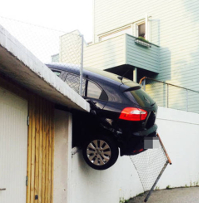 2 July - Visitors who bring their own lunch are always extra welcome;
in this case, interesting salads and American specialities.
Our visitors were able to enjoy basking in the peace of Ørsdalen in another day of fantastic hot sunshine and clear blue skies
and have now returned to the town as the sun was getting low along the lanes towards Vikeså.
2 July - Visitors who bring their own lunch are always extra welcome;
in this case, interesting salads and American specialities.
Our visitors were able to enjoy basking in the peace of Ørsdalen in another day of fantastic hot sunshine and clear blue skies
and have now returned to the town as the sun was getting low along the lanes towards Vikeså.
3 July - It's a while since we commented on the idiosyncrasies of car parking in Bergen. So here (right - click for enlargement) is today's illustration.
Comments
|
I was watching Fudge just now in the garden, going systematically from one fruit tree to the next and peering up into the branches. From time to time he stood up on his back paws and took a closer look at higher branches. It was obviously a tour of inspection: it looked as if he would have had a clip board with him if he could. I had to go and see what he was looking at so intently; and sure enough he was assessing and counting the first signs of what will be the autumn crop of plums and apples. (Photos here - the satellite dish on his head is not for communication purposes but to stop him licking a sore leg).
7 July - Needless to say, what they can do well in Bergen (see 3 July, above) they can do even better in Sweden.
10 July - this year in Germany - This summer's activities in Germany are a little complicated. Concerts are rather spread out (bad organisation), resulting in a good deal of coming and going. In addition, Katie is spending a week at a youth camp with our good friends in the former East Germany (an experience she enjoyed last year and is now repeating). So today, Katie and Tim flew to Berlin and hired a car — Tracy is following on next week. We drove for five miles from the airport before stopping for a three-hour swim, then continued for a few more miles before stopping for a wonderful chicken and tagliatelli dinner, then on to one of our regular hotel stopovers in mid-Germany, arriving so late that they'd left the key under the mat.
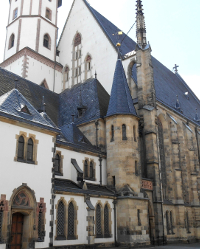
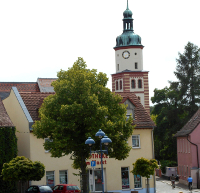 11 July - Leipzig -
When that time comes, one of the places Katie has considering studying is at the University of Leipzig, so today we visited Leipzig city centre for a look around.
At the university, we worked on the principle that, even where we didn't have the right security passes get in,
if you look busy enough and look as though you know exactly where you're going,
no-one will actually stop you.
It worked a treat, though it meant that it was a bit hit-and-miss precisely where we visited.
We ended up in the maths section of the university library, where the students were working intently on incomprehensible sqiggles.
Then we visited the social sciences section of the university library, where the students were sleeping soundly on couches.
Then we paid a brief visit to St Thomas' church, where J.S. Bach worked for the later part of his life, before heading on towards our friends.
(Click left for photo series, showing the contrast between the old architecture of St Thomas' and the strikingly modern architecture at the university - including the infamous 466-foot-high tower,
designed by a 1960s architect to look like an open book, but in deference to its actual appearence, known universally in Leipzig as the "wisdom tooth").
11 July - Leipzig -
When that time comes, one of the places Katie has considering studying is at the University of Leipzig, so today we visited Leipzig city centre for a look around.
At the university, we worked on the principle that, even where we didn't have the right security passes get in,
if you look busy enough and look as though you know exactly where you're going,
no-one will actually stop you.
It worked a treat, though it meant that it was a bit hit-and-miss precisely where we visited.
We ended up in the maths section of the university library, where the students were working intently on incomprehensible sqiggles.
Then we visited the social sciences section of the university library, where the students were sleeping soundly on couches.
Then we paid a brief visit to St Thomas' church, where J.S. Bach worked for the later part of his life, before heading on towards our friends.
(Click left for photo series, showing the contrast between the old architecture of St Thomas' and the strikingly modern architecture at the university - including the infamous 466-foot-high tower,
designed by a 1960s architect to look like an open book, but in deference to its actual appearence, known universally in Leipzig as the "wisdom tooth").
On the way, we stopped off in the village of Rötha for something to eat. (photo, above right - click for photo series).
This evening was spent pleasantly with our friends at Ponitz; late evening out in the dark garden watching the fireflies and drinking wine (photo, below right — click for enlargement).
Comments
|
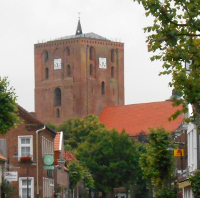 12 July - Marienhafe -
Left Katie in hot and sunny Ponitz (we're both well suncreamed) and set off to the other end of Germany.
Marienhafe is almost but not quite on the north coast and almost but not quite on the Dutch border.
I was eagerly watching out for signposts to it, but the first time I saw the name was on the little board that told me that I was there -
and even then I missed it the first time, drove past and had to come back.
At this end of Germany it's 15 degrees and raining heavily, so suncream was rather wasted.
Huge church from 1250 (photo, left - click for series) with a unique and very famous historical organ from 1710 by Georg von Holy (hence the concert)
and a "Störtebeker Room" in the cellar.
The main (only?) street has a "Störtebeker Hotel" and, incongruous in an otherwise clean and tidy hamlet,
a Störtebeker Grimy Hamburger Joint (greasy chef smoking on front step), along with a handful of shops
(photo), and that was the lot.
The "Störtebeker" thing is a puzzle.
I know the name, of course — famous pirate — but thought he lived at Rügen right at the opposite end of the German coast, hundreds of miles east of here, near the Polish border.
I asked around and was told that this was indeed the case, but that "he did get around and managed to plunder lots of places".
In fact, according to the guide book, he was actually born here (in 1400).
More appropriately, a "Störtebeker Swimming Pool" is signposted up the road: hopefully they have a "walk the plank" diving board.
I looked at the hotel with thoughts of dinner, but it was in darkness and there was a sign on the door saying "Closed on Monday".
Today is Sunday, but the implication was that you must be nuts to even contemplate Sundays.
I dutifully admired the size of the church and was told that it used to be three times as big in every dimension (length, width and height of tower),
making it the biggest triple-aisled cross-shaped Basilica in this part of Europe
until being reduced for unspecified reasons in 1830 (I suspect it just shrunk in the rain).
Looking at the photo you can see some oddly filled-in bits at the end and along the sides, as well as an oddly out-of-proportion tower.
In the church there's a drawing of the present church side-by-side with how it used to be -
and the present building is a midget in comparison with the former.
12 July - Marienhafe -
Left Katie in hot and sunny Ponitz (we're both well suncreamed) and set off to the other end of Germany.
Marienhafe is almost but not quite on the north coast and almost but not quite on the Dutch border.
I was eagerly watching out for signposts to it, but the first time I saw the name was on the little board that told me that I was there -
and even then I missed it the first time, drove past and had to come back.
At this end of Germany it's 15 degrees and raining heavily, so suncream was rather wasted.
Huge church from 1250 (photo, left - click for series) with a unique and very famous historical organ from 1710 by Georg von Holy (hence the concert)
and a "Störtebeker Room" in the cellar.
The main (only?) street has a "Störtebeker Hotel" and, incongruous in an otherwise clean and tidy hamlet,
a Störtebeker Grimy Hamburger Joint (greasy chef smoking on front step), along with a handful of shops
(photo), and that was the lot.
The "Störtebeker" thing is a puzzle.
I know the name, of course — famous pirate — but thought he lived at Rügen right at the opposite end of the German coast, hundreds of miles east of here, near the Polish border.
I asked around and was told that this was indeed the case, but that "he did get around and managed to plunder lots of places".
In fact, according to the guide book, he was actually born here (in 1400).
More appropriately, a "Störtebeker Swimming Pool" is signposted up the road: hopefully they have a "walk the plank" diving board.
I looked at the hotel with thoughts of dinner, but it was in darkness and there was a sign on the door saying "Closed on Monday".
Today is Sunday, but the implication was that you must be nuts to even contemplate Sundays.
I dutifully admired the size of the church and was told that it used to be three times as big in every dimension (length, width and height of tower),
making it the biggest triple-aisled cross-shaped Basilica in this part of Europe
until being reduced for unspecified reasons in 1830 (I suspect it just shrunk in the rain).
Looking at the photo you can see some oddly filled-in bits at the end and along the sides, as well as an oddly out-of-proportion tower.
In the church there's a drawing of the present church side-by-side with how it used to be -
and the present building is a midget in comparison with the former.
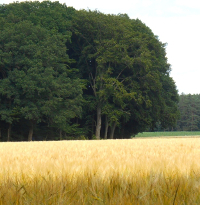 13 July -
I'm staying in a private flat, so as the organist had mentioned that there was a very good bakery in the village,
I ordered their breakfast this morning — fresh rolls, eggs, ham, cheese, salad, juice, coffee —
and watched dozens of people come in and out; some buying bread and cakes and some sitting down for breakfast like me.
Three members of staff were kept constantly on the run.
I got up to pay but the waitress waved me away.
"No, no — the organist rang and said that if you came in, we were just to write it on the church tab".
Maybe all these people came in just for a look at the stranger in the village.
13 July -
I'm staying in a private flat, so as the organist had mentioned that there was a very good bakery in the village,
I ordered their breakfast this morning — fresh rolls, eggs, ham, cheese, salad, juice, coffee —
and watched dozens of people come in and out; some buying bread and cakes and some sitting down for breakfast like me.
Three members of staff were kept constantly on the run.
I got up to pay but the waitress waved me away.
"No, no — the organist rang and said that if you came in, we were just to write it on the church tab".
Maybe all these people came in just for a look at the stranger in the village.
14 July - Concert went well and people were pleased, so it's time to move on. Heading eastwards, I used the trusty German hotels website to produce the cheapest "lucky dip" bed for the night - and got a very pleasant thatched-roofed hotel on the edge of the Lüneburg moors, which I explored for a while (photo, above right - click for picture sequence). No internet, though - had to "borrow" some for a moment to upload this.
16 July - Dropped in on Katie in Ponitz and together we took a short tour around the closest bit of the Thüringer Wald — the beautiful hilly and wooded landscape in mid-Germany in which Bach and an astonishing number of other famous musicians, playwrights and artists lived — and admired a constant succession of tiny villages, all 2 kilometres apart and each with its own picture-book church and half-timbered houses. (A few pictures here, but they don't do it justice).
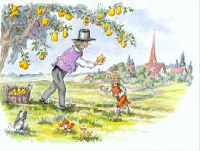 17 July - pair and pear -
Went to Berlin today to collect Tracy from the airport - so now we are a pair again.
17 July - pair and pear -
Went to Berlin today to collect Tracy from the airport - so now we are a pair again.
On the way, I indulged a long-standing ambition and visited the tiny village of Ribbeck in the Havel district just west of Berlin. The village is known for just one thing — a pear tree. The local squire of the manor, von Ribbeck, an almost exact contemporary of J.S. Bach, was apparently a kindly man who used to stuff his pockets with fruit from his garden to give to poor children on his daily walks around the village. When he grew old and was dying, he was worried that his only son was too tight-fisted to continue the tradition and he instructed that a pear should be put in his grave. This later grew into a pear tree in the churchyard and thus continued his fruit-based charity. The pear tree was struck by lightning in 1911 but the stump is still there. In the 1880s this history got turned into a story and a poem, which in due course was read by famous poet and author Theodor Fontane - a kind of German Wordsworth who specialised in narrative poems about the places and people of his beloved Havel district. Fontane composed a poem in the local dialect that rapidly became famous and is still learned by schoolchildren today. It's a lovely poem (for instance he describes the funeral in which the gentry were singing straight-laced funeral hymns in the church while the children were crying heartbroken outside the door) which describes how the man used to whisper to the children: "little girl, come over here: do you want a pear?" [NB - it is not recommended that you try this approach these days] and the poem ends with the tree in the churchyard whispering the same thing.
Nice story? That was just the beginning. The tree that was struck by lightning was re-planted. In the DDR (Communist East-Germny) period, the idea of a nice, kind aristocrat was a contradiction in terms: all landowners had to be Oppressors of the Poor. So the poem was banned, copies burned in public and the replacement tree chopped down. On re-unification, the western powers decided that this was a nice symbol of the return to normality so they rushed to plant a new, Politically-Correct pear tree in the village. Unfortunately they were in too much of a rush to read the poem properly and planted it in the wrong part of the village. The villagers then planted a new, Geographically-Correct pear tree in the churchyard. More recently, a botanist has proved that these trees are of a type not compatible with 18th-century pear trees, so he has proposed a new Botanically-Correct pear tree. The other German states have joined in and sent specimins of their own local pear-tree specialities to form a pear-tree garden.
My objective with the visit, though, was to see how a tiny German village capitalises on all this from a tourist point of view. In England, such a village would have been full of Ye Olde Pear Tree Tea Shoppes selling tacky souvenirs at inflated prices. On arriving, I was first a bit disappointed that the village straddles a main A-road only a few miles from Spandau, but once I got out of the car I found that the place was lovely. The manor house and church are beautifully restored (though the latter has a shockingly-terrible-looking electric organ behind the altar) - and I was delighted to find no less than four Ye Olde Pear Tree Cafes, one of which has a re-creation of Ribbeck's school room, complete with a piano from about 1930. One cafe had a pear-wood sign outside saying: "come over here: do you want a pear?", so of course I went there and had a coffee (complete with little pear-shaped biscuit) and pear cheese cake. It also had a shelf of tacky souvenirs. And all at terribly inflated prices. It was wonderful. (Click picture, above left, for photos).
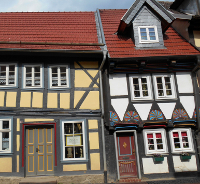
 18-19 July -
On our way from Berlin towards Ponitz to collect Katie, we stopped for the night at Stolberg — slightly out of the way but well worth it.
We really can't describe the town except to say that if some film maker had built it as a set for a film set in the 1500s everyone would say that it was way over the top.
The only buildings that aren't half-timbered are the church and the castle; the cobbled streets are lined with rows of (genuine, original) medieval half-timbered houses.
It was almost impossible to decide what not to photograph — we've included just half a dozen photos here (click photo, left, for picture series).
The 14th-century castle towers over the village (would have been perfect for filming Chitty, Chitty, Bang Bang).
It's been under restoration since 2002 with funds from a government trust and will eventually feature a very exclusive hotel.
In the meantime we were able to go in (our reward for making it up a very steep hill in hot sunshine and for dodging the fire from canons that were being shot from the walls)
and look round the already-spectacular interior (click photo, right, for picture series).
18-19 July -
On our way from Berlin towards Ponitz to collect Katie, we stopped for the night at Stolberg — slightly out of the way but well worth it.
We really can't describe the town except to say that if some film maker had built it as a set for a film set in the 1500s everyone would say that it was way over the top.
The only buildings that aren't half-timbered are the church and the castle; the cobbled streets are lined with rows of (genuine, original) medieval half-timbered houses.
It was almost impossible to decide what not to photograph — we've included just half a dozen photos here (click photo, left, for picture series).
The 14th-century castle towers over the village (would have been perfect for filming Chitty, Chitty, Bang Bang).
It's been under restoration since 2002 with funds from a government trust and will eventually feature a very exclusive hotel.
In the meantime we were able to go in (our reward for making it up a very steep hill in hot sunshine and for dodging the fire from canons that were being shot from the walls)
and look round the already-spectacular interior (click photo, right, for picture series).
Then on to Ponitz for the performance of the musical that Katie has been involved with this week. The musical was on the theme of Esther (Katie was a court official) and went off very well. 2 pictures here.
20 July - We set out from Ponitz with the intention of finding a lake to swim in, but the weather was just a little too unsettled (there was a danger of getting wet if it rained) so instead Tracy and Katie got excellent haircuts before we visited a small town in the Thüringer Wald and attempted to reach the local swimming pool. On the way, however, we got mixed up in a cycle race which effectively chased us out of town. A couple of dozen police vans and more police motorcycles than you could imagine kept us moving in entirely the wrong direction, while a helecopter hovered overhead. In the end we managed to sneak into a clearing in the trees by a bridge, together with a film crew from MDR (Mid-German Broadcasting) and watched the whole thing swarm past. (A few pictures here). Then we returned to the town for our swim.
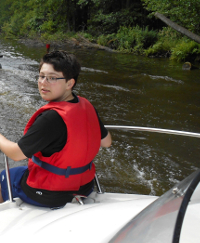 Evening with our good friends in Ponitz, drinking wine, chatting, playing Uno and watching out for the now elusive fireflies (photo here).
Evening with our good friends in Ponitz, drinking wine, chatting, playing Uno and watching out for the now elusive fireflies (photo here).
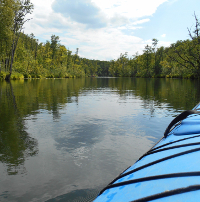 21-22 July -
Heading north from Ponitz, we are visiting the Meklenburg Lakes — something similar to the Norfolk Broads but far, far bigger, at least as beautiful and a lot warmer.
It's also less crowded and a lot more relaxed.
We've checked into a lakeside hotel at Mirow
(a town that boasts of being the birthplace of Queen Charlotte, wife of George III),
taken a quick tour of the surrounding countryside (like this lovely cornfield)
and then spent the whole of Wednesday in a hired motorboat (or, in the case of Katie and Tim, mostly just outside the hired boat — the rivers and lakes were perfect for a swim every half hour or so).
(click photo, left, for series).
Memorable and contented day.
21-22 July -
Heading north from Ponitz, we are visiting the Meklenburg Lakes — something similar to the Norfolk Broads but far, far bigger, at least as beautiful and a lot warmer.
It's also less crowded and a lot more relaxed.
We've checked into a lakeside hotel at Mirow
(a town that boasts of being the birthplace of Queen Charlotte, wife of George III),
taken a quick tour of the surrounding countryside (like this lovely cornfield)
and then spent the whole of Wednesday in a hired motorboat (or, in the case of Katie and Tim, mostly just outside the hired boat — the rivers and lakes were perfect for a swim every half hour or so).
(click photo, left, for series).
Memorable and contented day.
23 July - An energetic day.
Today we explored Rätzsee Lake and adjoining river by kayak (it's a motor-free zone).
It was stunningly beautiful and we're determined to come back next year and spend a full week at the camp site from which we hired the kayaks.
After a full day of kayak paddling (Katie was moving at 9km/hour, with less-fit parents attempting in vain to keep up)
and the occasional swim for Katie and Tim we're now trying to recover.
(Click photo, right, for series).
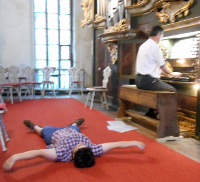 24-26 July -
We've headed a few miles south to Angermünde for the next concert.
The hotels pot-luck website landed us surprisingly in a fantastic stately home with acres of grounds, which we have enjoyed immensely,
including swimming pool, private lakeside beach and good restaurant.
Due to a mix-up with the internet booking the hotel has had to upgrade us to two interconnecting double rooms in the best part of the hotel.
Angermünde itself is a pleasant town some miles north-east of Berlin, almost on the Polish border -
and, of course, with an organ by another famous 18th-century organ builder (J. Wagner, who also built the organ at Trondheim Cathedral).
(Click photo, left, for series).
24-26 July -
We've headed a few miles south to Angermünde for the next concert.
The hotels pot-luck website landed us surprisingly in a fantastic stately home with acres of grounds, which we have enjoyed immensely,
including swimming pool, private lakeside beach and good restaurant.
Due to a mix-up with the internet booking the hotel has had to upgrade us to two interconnecting double rooms in the best part of the hotel.
Angermünde itself is a pleasant town some miles north-east of Berlin, almost on the Polish border -
and, of course, with an organ by another famous 18th-century organ builder (J. Wagner, who also built the organ at Trondheim Cathedral).
(Click photo, left, for series).
Answer to competition
|
Before leaving the area we visited the nearby town of Templin in search of entertainment and dinner. Templin has 14th-century town walls and a gatehouse with fancy bits on the top. It also had 27 hairdressers — some streets had rows of them like Welsh chapels — but no-where to eat other than schnitzel places (we concluded that the town must be full of hungry but elegantly-styled citizens) so we returned to our hotel, which as it happens was serving a wonderful multi-course buffet that evening, so all ended well.
27-28 July - Katie and Tracy are returning to Norway by the improbably-named airline Whizz Air from the Polish city of Szeczecin (how many Scrabble points do you get for Szeczecinesque?), which is only a few miles over the border from Angermünde. First, though, we had to return the hire car to Berlin airport and collect a new one (we'd worn out the first) so we took a little nostalgic tour back to Potsdam (a city we visited and loved a couple of years ago), where we visited the querky shops and ate in an elegant cafe.
We also stopped off at the famous "Alex" — Alexanderplatz (named after a visit by the Czar in 1805), which was at the heart of the former East Berlin. Our sightseeing there consisted chiefly of a visit to Decathlon (the sports shop) which provided all manner of useful things, including a "two-second" pop-up tent which will provide emergency accommodation for Tim as he continues his concert tour. The tent, which leaps into position when taken out of its bag, is supposed to fold back up again afterwards. Our first attempt to do so, aided by Ikea-style instructions that show a happy little figure contorting himself into strange yoga-like positions as he fights with the wierd shapes of the tent, took eight minutes, which was only 7 minutes 58 seconds longer than intended.
Without the aid of the invaluable website (which for once had let us down and found nothing suitable on our route) we stopped off at a roadside hotel on the way to Poland. It was expensive, faintly mildewey and grimy round the edges. The only other guests were ancient — a silent old lady in a pink nightie and a lonely and antiquated mad professor. We're unsure whether they actually were alive or were just ghosts. Our compensation was the breakfast room, which featured painted murals on the walls showing a Tuscan landscape through painted-on windows, with plastic trees on the inside of the walls and the most extraordinary variety of ornaments, including African elephants and a kind of stable scene consisting bizzarly of three angels and a wicker duck. We puzzled over this for a while, before concluding that it was the "hellig and" (only our Norwegian readers will understand that one - sorry).
We continued over the border to Szeczecin.
Apart from rapidly coming to terms with Polish overtaking (when someone overtakes, traffic coming the other way is expected to squeeze onto the pavement/cycle track)
we were struck by the modern normality of the shopping centre with its big European chain stores,
side by side with a few odd corners that might have come from a cold-war film and eccentricities such as a cobbled motorway slip road, complete with sign prohibiting horses and carts.
From the city centre, with its handsome cathedral, we correctly guessed the road towards the airport, eventually picking up a signpost to it and just as quickly losing it again.
Quite a few miles out of the city we stopped at a petrol station.
"I'm looking for the airport", I hand-signalled to the Polish-only-spoken-here attendant.
Fortunately he was a world-class expert at charades.
"Ah", he acted back.
"Are you sure you mean the Szeczecin airport on the roadsign, which is only a little local airport?"
(the charades code for the latter being a day-old chicken doing baby-sized hops)
"or do you really want the main international airport?".
I signalled back that we wanted a direct flight to Stavanger.
This, he assured me, would require nothing less than Goleniów International, which was some 30 miles further along the motorway.
Heading down the motorway we were concerned at the lack of planes overhead and slightly worried in case Whizz Air actually used the smaller local airport.
We eventually found the field containing the international airport and drove to the door of the terminal.
The terminal building was about the size of a large bus shelter and the staff of one — the only person in sight — was sitting at the little coffee stall inside.
Photo of airport including runway and terminal building here.
They successfully Whizzed and are now safely home.
Not wanting a repeat of last night's hotel experience, Tim opted for the emergency pop-up tent solution, thus ensuring a night of strong winds and heavy rain. The lady at the camp site the next morning couldn't understand what had happened to the weather: "it's not usually like this". I didn't mention that this inevitably happens if I venture into a tent, or that the last time I spent a night under canvas — about 8 years ago — it almost destroyed the Isle of Wight.
29-30 July - Katie and Tracy are recovering in Ørsdalen; Tim is in Colditz. Not locked in, as on a former unforgettable occasion when Thomas Andrew and I got accidentally shut in for the night at closing time, with only hours to go before playing a concert, but in the "suburb" of Polditz, ready for the next concert tomorrow.
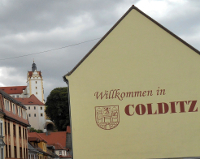 I left the Leipzig motorway at the disconcertingly-named town of Grimma and spent a frustrating few miles following a combine harvester
down winding roads (resisting the temptation to jump out and ask whether he was the Grimma Reaper) before arriving at a petrol station within sight of Colditz Castle.
1 Euro spent there on a cheese and ham toastie turned out to be the day's best investment,
as it brought with it not just the key to the toilets but also detailed instructions on how to find Polditz, which wasn't on my map.
A look of panic came into the lady's eyes when I asked for the latter and she spent 10 minutes or so agonising over how to do it
and banging the counter in frustration as she tried to remember the names of villages and streets.
Eventually she produced a written sheet: first this village, then that, then this road towards somewhere else.
Colditz (click photo, right, for 2 pictures) has not changed much in the 8 years since Thomas Andrew and I were here.
The castle has had a lick of paint and they've changed the locks (because we managed to get out so easily).
A couple more shops seem to be occupied
and there's now evidence of some small awareness of the historical significance of the castle — one shop had some books about it and another had some pictures.
But there are still empty buildings along the village street.
When the camp-site lady (a little north-east of Berlin) asked me this morning where I was heading for, she'd never heard of Colditz.
A decade ago, people 20 miles ago had never heard of it either:
at least now it's well signposted.
Last time, one house built into the castle walls had a forlorn "for sale" sign that looked as though its owner didn't hold out much hope of a sale.
I looked for the same building this time, but found just a patch of empty ground.
I left the Leipzig motorway at the disconcertingly-named town of Grimma and spent a frustrating few miles following a combine harvester
down winding roads (resisting the temptation to jump out and ask whether he was the Grimma Reaper) before arriving at a petrol station within sight of Colditz Castle.
1 Euro spent there on a cheese and ham toastie turned out to be the day's best investment,
as it brought with it not just the key to the toilets but also detailed instructions on how to find Polditz, which wasn't on my map.
A look of panic came into the lady's eyes when I asked for the latter and she spent 10 minutes or so agonising over how to do it
and banging the counter in frustration as she tried to remember the names of villages and streets.
Eventually she produced a written sheet: first this village, then that, then this road towards somewhere else.
Colditz (click photo, right, for 2 pictures) has not changed much in the 8 years since Thomas Andrew and I were here.
The castle has had a lick of paint and they've changed the locks (because we managed to get out so easily).
A couple more shops seem to be occupied
and there's now evidence of some small awareness of the historical significance of the castle — one shop had some books about it and another had some pictures.
But there are still empty buildings along the village street.
When the camp-site lady (a little north-east of Berlin) asked me this morning where I was heading for, she'd never heard of Colditz.
A decade ago, people 20 miles ago had never heard of it either:
at least now it's well signposted.
Last time, one house built into the castle walls had a forlorn "for sale" sign that looked as though its owner didn't hold out much hope of a sale.
I looked for the same building this time, but found just a patch of empty ground.
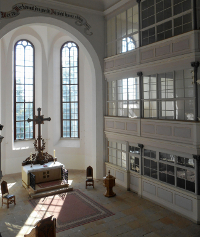 Despite the petrol-station instructions, Polditz was not an easy place to find.
It's not just the size (the village consists of one extremely large church - photo, left: click for series - and a dozen small houses)
but the complexity of the surrounding landscape.
Although it's only three miles from Colditz I got lost several times and had to look at a map on an information board.
On the way I firmly resisted the dubious attractions of the Museum of Dental History,
dismissing it as just floss (or, as Norah might say, "dim at ddant pawb").
Despite the petrol-station instructions, Polditz was not an easy place to find.
It's not just the size (the village consists of one extremely large church - photo, left: click for series - and a dozen small houses)
but the complexity of the surrounding landscape.
Although it's only three miles from Colditz I got lost several times and had to look at a map on an information board.
On the way I firmly resisted the dubious attractions of the Museum of Dental History,
dismissing it as just floss (or, as Norah might say, "dim at ddant pawb").
The church is vast — 60 feet of headroom inside and three stories of galleries providing seating for 1000 people — and, according to the church warden who came to unlock the place for me, tends to feel rather empty on an average Sunday service, which attracts only a quarter of the village's 48 inhabitants. The building originally featured a Salisbury-Cathedral-style spire, but this was demolished in 1980 because the village couldn't afford to repair it. I asked why such a vast building existed in such a tiny village. "When it was built, in 1860, they'd just found coal nearby and thought that these villages would grow into a big industrial centre, but it never happened", said the church warden. Despite its size, it has a very pleasant atmosphere, a feeling of simplicity and devotion — and lovely views over the surrounding woods and fields.
The concert went extremely well and afterwards I was wined and partied at the organist's house. Tomorrow it's off to the next concert venue — another tiny village, this time many hours' drive south of here, on the border between Thüringen and Bavaria. Under these circumstances it felt safe to play the same programme again. As I was leaving, the organist said: "By the way, three people this evening said that they were going to your next concert the day after tomorrow".
31 July -
I've stayed the past two nights at a guest house/private hotel in the next hamlet, as a guest of the church.
I overheard a conversation last night between the organist and someone else.
"Where's he staying?"
"With Hans and Anna".
"Are they friendly?"
"If anything, a bit over-friendly".
As I left this morning, Hans and Anna quizzed me about how the concert had gone.
And was I sure I'd had enough breakfast for my long journey?
Should they pack me a sandwich?
Take some coffee to have in the car - and drive safely.
Comments
|
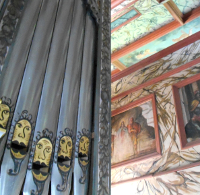 It's funny how this trip is turning into a nostalgic voyage.
I last visited Colditz together with Thomas Andrew some 8 years ago; the same is true of the quiet little village of Bedheim, where I've just arrived for tomorrow's concert (which was booked three years ago!).
The road from the motorway was still very familiar and I parked the car on the same bit of grass as last time, by the log pile round the back of the church.
The church itself is unforgettable, though different in every respect from yesterday's.
It's tiny and the walls and ceiling (even the organ pipes) are covered in painted decorations and murals.
The organ is a marvel of 1721 engineering: two separate organs, one at each end of the church,
played from two manuals at the same console, using mechanical rods spanning the full length of the church, over the ceiling.
(Click photo, right, for picture series).
It's funny how this trip is turning into a nostalgic voyage.
I last visited Colditz together with Thomas Andrew some 8 years ago; the same is true of the quiet little village of Bedheim, where I've just arrived for tomorrow's concert (which was booked three years ago!).
The road from the motorway was still very familiar and I parked the car on the same bit of grass as last time, by the log pile round the back of the church.
The church itself is unforgettable, though different in every respect from yesterday's.
It's tiny and the walls and ceiling (even the organ pipes) are covered in painted decorations and murals.
The organ is a marvel of 1721 engineering: two separate organs, one at each end of the church,
played from two manuals at the same console, using mechanical rods spanning the full length of the church, over the ceiling.
(Click photo, right, for picture series).
Comments
|
"Mm, that's rather un-German", said the Dutch architect as he brought me my salad in the castle garden. Just to unravel that a little, the Dutch architect had acquired a German girlfriend while studying in Weimar. On graduating he was offered a job in Switzerland, but his girlfriend said that the people were funny there, so they came to live here in Bedheim, where a friend of theirs had just inherited the castle next door to the church, and opened a cafe in the castle grounds. He also has an arcitectural practice in Bedheim, but as there isn't much trade here he has a part-time job in Munich as well. The thing that was rather un-German was actually the poster for tonight's concert. We won't bother with another competition - enough to say that the date given for the concert is "Sunday 1 August", where 1 August is actually Saturday. I mentioned that the poster for an earlier concert had been a whole month out, which seemed to please him greatly in a "one in the eye for these super-efficient Germans" kind of way. I perhaps ought also to have mentioned a hymn book that I glanced at in Polditz the other day and which I photographed as a special "spot-the-problem" treat for organists only (picture here - organists like that sort of thing).
32 July (no time to make August page so I'm taking liberties with the calendar, as they seem to do around here).
Concert went very well: the church was packed out and people were very happy.
Now heading onwards towards the next two concert venues.